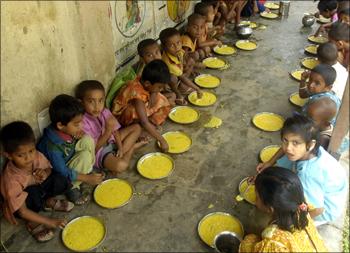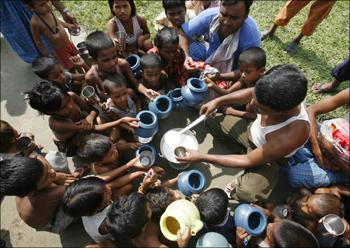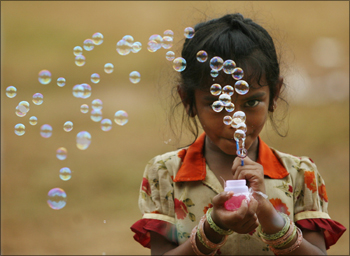 | « Back to article | Print this article |
25 mn more kids to go hungry by 2050; India to be worst-hit
Over 25 million more children will suffer from malnourishment by 2050 due to effects of climate change and India will be one of the worst affected in the Asian region, a report by the International Food Policy Research Institute said on Wednesday.
However, the study finds that the scenario of lower yields, higher prices, and increased child malnutrition can be averted with $7 billion additional annual investments in rural development especially in developing countries.
$7 billion per year of additional investments in agricultural productivity is to help farmers to adapt to the effects of climate change. Investments are needed in agricultural research, improved irrigation, and rural roads to increase market access for poor farmers, Gerald Nelson, IFPRI senior research fellow and a lead author told media in a teleconference on Tuesday night from Washington.
Developing countries will be hit hardest by climate change and will face bigger declines in crop yields and production than industrialised countries.
25 mn more kids to go hungry by 2050; India to be worst-hit
The negative effects of climate change are especially pronounced in Sub-Saharan Africa and South Asia. Compared to the average biophysical effects of climate change on yields in the industrialised world, the developing countries fare worse for almost all crops, he said.
- Asian countries most vulnerable to climate change are India, Afghanistan, Bangladesh, Cambodia, Lao PDR, Myanmar, and Nepal.
- India, Afghanistan, Bangladesh and Nepal are particularly vulnerable to declining crop yields due to glacial melting, floods, droughts, and erratic rainfall, among other factors.
- Asia is the most disaster-afflicted region in the world, accounting for about 89 percent of people affected by disasters worldwide.
- More than 60 percent of the economically active population and their dependents -- 2.2 billion people -- rely on agriculture for their livelihoods in developing parts of Asia.
25 mn more kids to go hungry by 2050; India to be worst-hit
The study, Climate Change: Impact on Agriculture and Costs of Adaptation, was prepared by IFPRI for inclusion in two separate reports from the Asian Development Bank and the World Bank, both released on Wednesday in conjunction with international climate change meetings in Bangkok, Nelson said.
"Without new technology and adjustments by farmers, climate change will reduce irrigated wheat yields in 2050 by around 30 per cent in developing countries compared to a no-climate change scenario. Irrigated rice yields will fall by 15 per cent," he said.
The study also pointed out that even without climate change, food prices will rise, but climate change makes the problem worse.
"Without climate change, in 2050 wheat prices will increase globally by almost 40 per cent. With climate change, wheat prices will increase by up to 194 per cent, Nelson said.
Rice is projected to increase 60 per cent without climate change, but it will go up by as much as 121 per cent with climate change in the report.
25 mn more kids to go hungry by 2050; India to be worst-hit
In 2050, prices of maize will be more than 60 per cent higher without climate change, but they will be up to 153 per cent higher with climate change.
The authors hoped that the climate change conference at Copenhagen (Denmark) in December, will take this issue seriously and do something urgently to avert a disaster of huge malnutrition projected by the report.
In addition to increased funding for rural development, IFPRI recommends more open agricultural trade to ensure that food will reach the poorest populations in times of crises.
If governments and donors begin now to invest seriously in adaptation for poor farmers, we can avert this bleak future, he said.
Explaining their findings, Nelson said, agriculture is extremely vulnerable to climate change. Higher temperatures eventually reduce yields of desirable crops while encouraging weed and pest proliferation, they said.
25 mn more kids to go hungry by 2050; India to be worst-hit
Changes in precipitation patterns increase the likelihood of short-run crop failures and long-run production declines.
"Although there will be gains in some crops in some regions of the world, the overall impacts of climate change on agriculture are expected to be negative, threatening global food security," Nelson added. Populations in the developing world, which are already vulnerable and food insecure, are likely to be the most seriously affected.
In 2005, nearly half of the economically active population in developing countries-2.5 billion people relied on agriculture for its livelihood. Today, 75 per cent of the world's poor live in rural areas, he added.




